Confronting Vladimir Putin: the day he made his brutal Ukraine war personal
The Russian President’s reaction to my ‘shirtfront’ moment – that the Ukrainians were all fascists, and that Ukraine had no right to exist – epitomised the Putin obsession to recreate greater Russia.
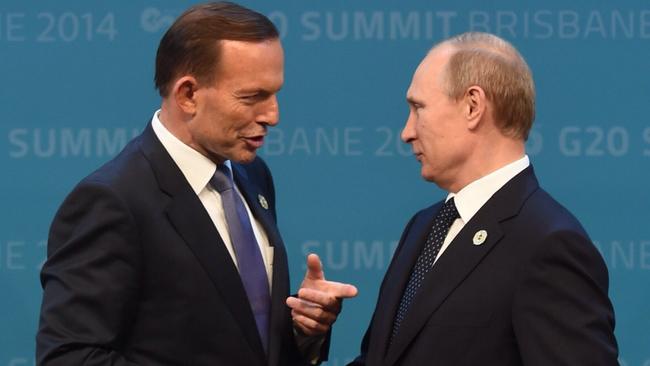
At about 5.15am, on July 18, 2014, I was in the gym, preparing for a day intended to dwell on the repeal of the carbon tax late the previous evening, when the news started to come through that Malaysia Airlines flight MH17 had been shot down over eastern Ukraine and Australians were on board.
From the beginning, it was clear that this was a crime, not an accident; an atrocity not a tragedy.
It soon transpired that there were 38 Australian victims of Putin’s first invasion, murdered by a Russian missile battery that had crossed into Ukraine as part of his stooge attack on the eastern Donbas.
I told our parliament that morning, “The bullying of small countries by big ones, the trampling of justice and decency in the pursuit of national aggrandisement, and reckless indifference to human life, should have no place in our world.”
I have never ceased to thirst for justice for those Australians, cast into eternity, because the Russian dictator could not bear to see an independent Ukraine.
And I have never ceased to want freedom and democracy for Ukraine, a country yearning to be rid of the bondage of Moscow.
As the pro-Russia militia looted the wreckage over several days, working back then with the Malaysians and especially with the Dutch, as prime minister, I demanded a military plan to secure the site.
It might have been the prospect of 1000 Australian soldiers on Russia’s border that swayed Putin’s proxies belatedly to allow police and investigators to retrieve the bodies, and to collect the evidence that later allowed a Dutch court to convict the Russian officers responsible.
Even though it wasn’t necessary in the end, I will always be grateful to then-president Petro Poroshenko and the Ukrainian parliament for unanimously granting Australian military forces the right to operate in their country. And I’m pleased that for a year or so afterwards, Ukrainian military personnel were welcomed into our training programs, for help in their fight for national freedom.
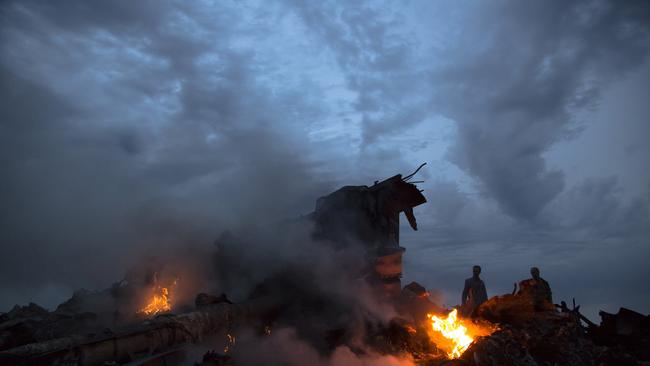
A few months later, I had my “shirtfront” discussion with Putin – that’s Australian sports-slang for a very rough tackle – when I told him that Russian missile batteries don’t go abroad by accident; and that he owed it to the families of the dead to apologise and to pay compensation.
His reaction – that Ukrainian provocateurs had downed the plane, that the Ukrainians were all fascists, and that Ukraine had no right to exist – epitomised the Putin obsession to recreate greater Russia.
It even took a bizarre turn, when he suddenly, quite literally, grabbed and shook me, saying in English, “you are not a native Australian, but I am a native Russian”.
Which I took to be a weird way of insisting that a settler society citizen could never grasp the mystical connection of blood and soil, that meant Kievan Rus, at least in his tortured mind, must never be free of mother Russia.
Two years later, visiting Kyiv as an ex-PM, I was assured by President Poroshenko that Ukraine was readying itself for Putin’s next assault.
So I wasn’t entirely surprised when what was expected to be a Russian walkover, in February last year, dissolved into a shambles of tanks running out of fuel, soldiers losing their way, and the slaughter of innocent people – with a 65km-long column of Russian armour that was supposed to be a threat turning into a target for Javelins and NLAWs.
It shouldn’t really have been a shock that the Ukrainians had higher morale, greater initiative, and smarter tactics; because they were defending their homes, while the Russians were just obeying their leader.
Although leadership does matter.
It was Volodymyr Zelensky’s scornful rejection of President Joe Biden’s chopper ride to safety that meant Kyiv was no Kabul, and marked the Ukrainian President as the Churchill of the 21st century.
American and British arms deliveries certainly helped, even in those early days, and will be vital for the counter-attack that we must all hope will drive Russian forces from every inch of Ukraine.
However, it’s not other people’s weapons that will win this war, but Ukrainians’ love of country.
I had a glimpse of this 41 years ago, thanks to one of my best friends at Oxford, an American whose parents had been taken as slave labourers to Germany, before settling in Michigan. He persuaded me to accompany him on an InTourist trip to the then Soviet Union.
While the retired British trade unionists were wishing each other “happy socialist 65th birthday”, Ihor was walking his ancestral streets, rhapsodising about being home, in between teaching me about the Holodomor, Stalin’s man-made famine, that killed up to five million people, to break the spirit of Ukraine’s independent farmers.
It’s beyond me that supposedly sophisticated Western experts, persisted in thinking that eastern Ukraine was somehow pro-Russian, when it had voted nearly 90 per cent for independence from the old Soviet Union, scarcely less than the rest of the country.
Then there’s this idea that Putin’s war was, somehow, provoked by NATO; by NATO’s expansion east, to take in Romania, Poland, Hungary, the old Czechoslovakia and the Baltic states.
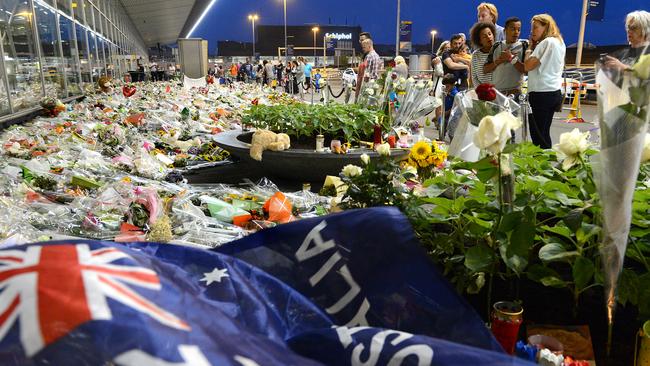
But NATO never sought new members; it was the new members that sought NATO. Because without collective security they feared being picked off one by one – a fear abundantly justified by Putin’s habitual resort to force against ex-Soviet states.
And as for this view that the 2014 Maidan protest was somehow engineered by the CIA, just because some US politicians were barracking for it; and that the CIA then maintained biological weapons factories inside Ukraine – that’s a fiction ranking with the Protocols of the Elders of Zion.
It’s actually Putin’s line, that a Russian-speaking Jew from eastern Ukraine is somehow a neo-Nazi, just because he’s not anyone’s puppet, that’s the brazen lift from Joseph Goebbels’ propaganda playbook.
When Putin sought to reclaim what he saw as a rebel province of mother Russia, he was asserting that might is right.
That the strong may do what they will, and the weak should suffer what they must.
Yet he’s not the only dictator seeking to reclaim what’s said to be a rebel province.
That’s why this is not just a fight between Russia and Ukraine, but a fight between freedom and dictatorship.
Dictators everywhere have a stake in Putin’s success; and every free country a vested interest in Putin’s failure.
There’s not the slightest doubt that Beijing is watching what happens here, weighing what it might do across the Taiwan Strait.
In that sense, Ukrainians are fighting not just for their own freedom but for the freedom of every smaller nation threatened by a larger neighbour.
Ukraine is not the only country under existential threat, but it’s the one most threatened now; that’s why it’s the global frontline of freedom, and why every free country should rally to its side.
So good on Australia for swiftly offering 90 Bushmaster infantry transports, as requested by President Zelensky in his Zoom address to the Australian parliament last year.
And then for agreeing to train, in Britain, hundreds of Ukrainian soldiers, starting from December.
Unfortunately, there’s been nothing since then: no more Bushmasters, even though we still have about a thousand in stock; none of the Hawkei light armoured cars that the Ukrainians want to use as mobile missile launchers, even though we’ve a thousand of them in stock too.
It’s even been suggested that the Hawkei cannot be sent because of a fault with the brake system warning light – hard to credit this excuse, isn’t it, dreamt up by some bureaucrat in uniform?
Still, I know that the Australian government wants us to remain Ukraine’s best friend in Asia, and I’m confident that Prime Minister Albanese won’t go to the coming NATO summit without a big new arms package to help keep Ukrainian soldiers alive, as they seek to reclaim their homes.
Likewise, I expect that our ambassador will swiftly return to Kyiv from Warsaw, as it’s so out of character for Australians to huddle in safety when there’s work to be done.
What’s happening just east of here is a catastrophe of epic proportions that could so easily befall many other nations if dictators come to think that war might work for them.
It’s not everyone’s job to fight, but it is everyone’s job to help, lest a new iron curtain descend in eastern Europe, and lest preparing for war become the world’s new focus.
One day, perhaps, the lion will lie down with the lamb, and swords will be beaten into ploughshares, but until then, freedom and safety will thrive only because the strong stand guard.
It’s an honour to be here in solidarity, if only for a few days, among the Ukrainian people, whose bravery has astonished and inspired the world. And to pray that the good God, your friends’ aid, and your own strength grants the victory that freedom needs.
Once this war is done, the only way to preserve the peace is for Ukraine to have the security guarantee that only NATO membership can give.
This is a speech Tony Abbott delivered to the Kyiv Security Forum on Thursday night.


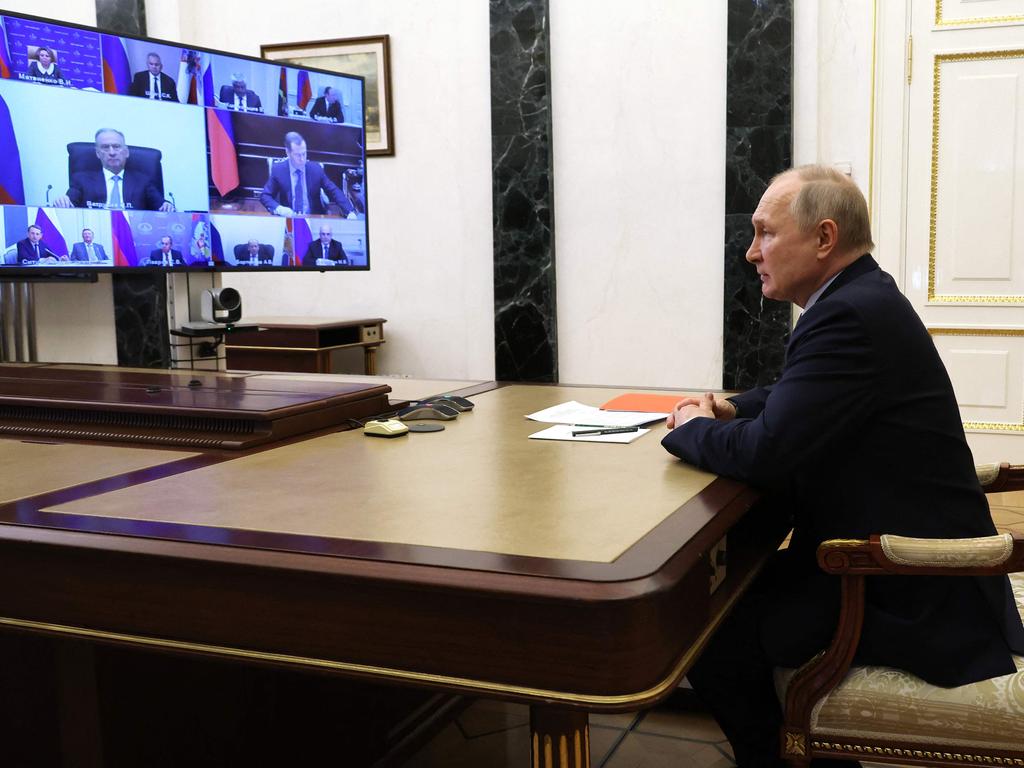
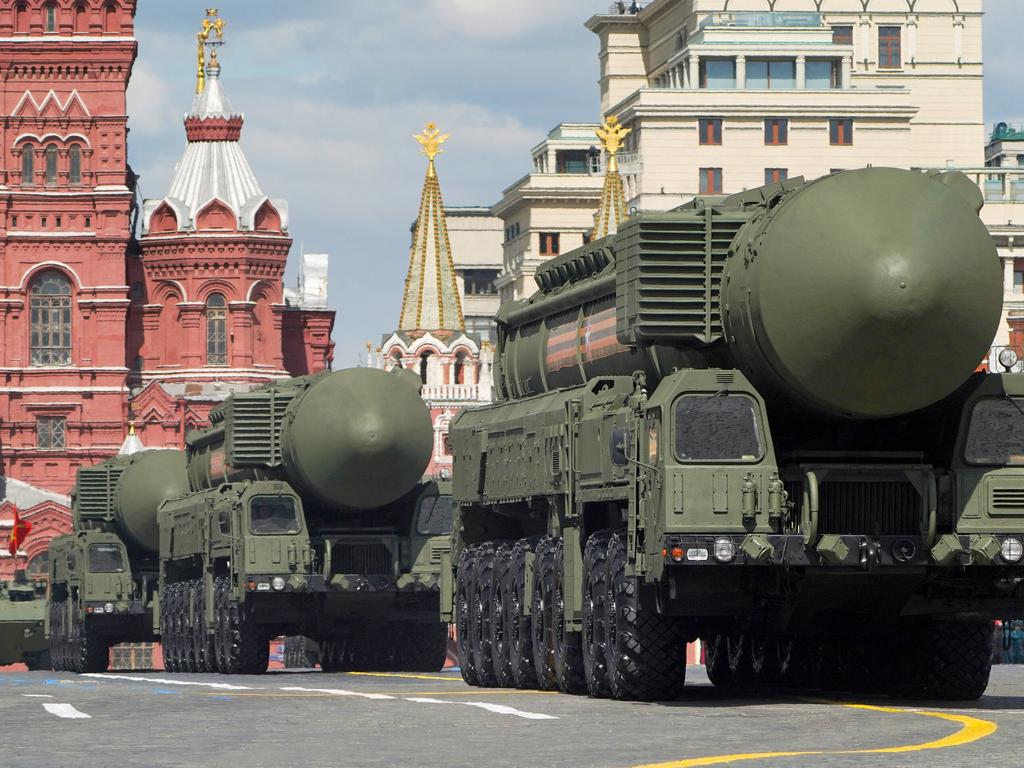

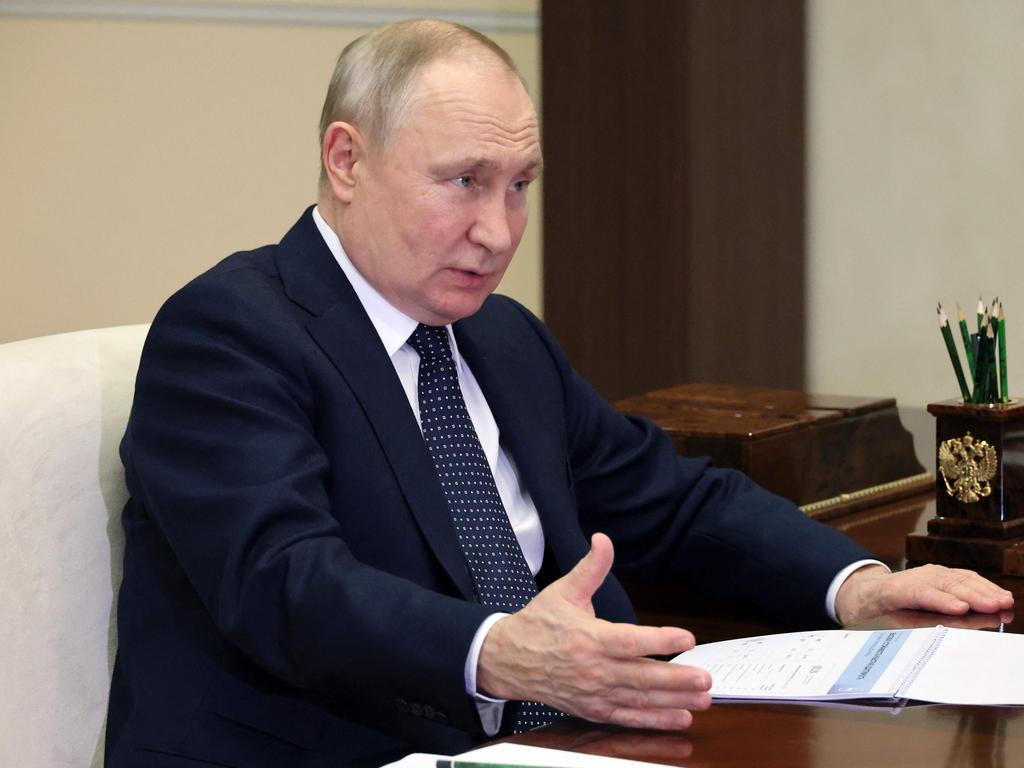


For me, Vladimir Putin’s war on Ukraine has long been personal.